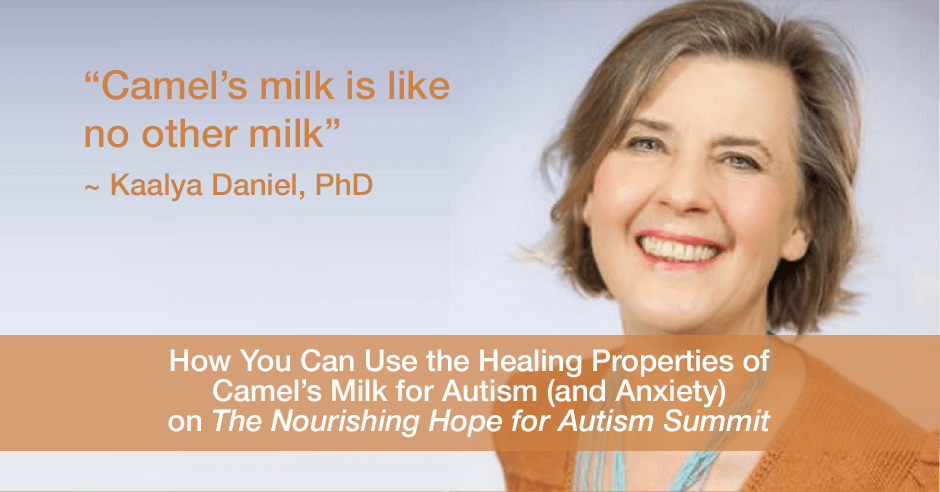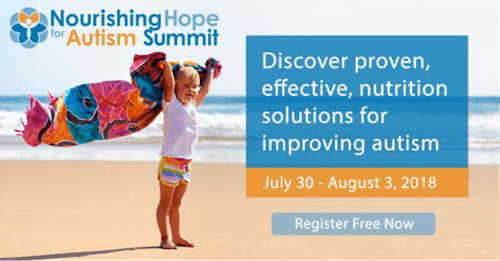
Kaalya Daniel, PhD covers the very interesting topic of camel milk in her interview on The Nourishing Hope for Autism Summit
How You Can Use the Healing Properties of Camel’s Milk for Autism
Camel’s milk is like no other milk. You’ll learn the unique and powerful immune system properties and nutrient benefits of this milk, from an animal known to endure extreme conditions. And how it helps with autism, even when you can’t tolerate other milk.
I don’t have access to the interview transcript yet but since this is a new topic I haven’t yet blogged about I’ve decided to highlight this interview as one I’m really interested in exploring for mom’s in my community with children on the spectrum, with ADHD or other developmental disorders.
In case you’re new to camel’s milk, a paper published in 2015 – Nutritional and Therapeutic Characteristics of Camel Milk in Children: A Systematic Review, shares the following:
Camel milk is the closest to a human mother’s milk. Camel milk is different from other milks, however, having low sugar and cholesterol, high minerals (sodium, potassium, iron, copper, zinc and magnesium, and vitamin C). The milk is considered have medicinal characteristics as well.
The study concludes that there is evidence denoting the importance, usability and benefits of camel’s milk:
Camel milk as a supplemental treatment seems less invasive and costly than specialist care, medications, alternative treatments, and behavioral interventions. Based on our findings, camel milk is safer for children, effective in the treatment of autism, improves general well-being, promotes body natural defenses, is a good nutritional source, and can helps the daily nutritional needs of humans.
Given the many overlaps we see with autism/ASD and anxiety/depression, it’s clear that camel milk has wide applications given the benefits we see has for immunity, the gut and inflammation, as well as providing nourishment when dairy cannot be tolerated. As you can see in the above study below camel milk consumption has been shown to improve general well-being.
I’m not sure if anxiety and GABA is covered in the interview but I did find some interesting research reporting that both camel and goat milk have significantly more bioavailable GABA than cow and human milk – which may be another beneficial mechanism.
Here are just a few of the other speakers and topics I’m really looking forward to hearing:
- James Adams, PhD: The Scientific Evidence Linking Nutrition and Autism Improvement
- Dietrich Klinghardt: Understanding Lyme, Infections, Mold, and Heavy Metals and the Effects on Autism
- Chef Pete Evans: Food is Medicine, Inspiration from a chef
- Dominic D’Agostino, PhD: Is the Ketogenic Diet Right for an Autistic Child?
- Susan Owens, MS: The Inflammasome, Oxalates, Autoimmunity and Autism
- And of course, Julie Matthews, CNC: When GFCF Diets Don’t Work – BioIndividual Nutrition for Autism (I’m actually going to interview Julie on this topic)
In my interview we go into anxiety, OCD and aggression in great detail, discussing the amino acids GABA and tryptophan, plus gluten issues and when and how to use inositol.
This summit provides you with information and tools that address the root causes of autism, ADHD and many other conditions including anxiety.
The Summit runs July 30 to August 3 and is hosted by my dear friend and colleague Julie Matthews, whose work you’re probably very familiar with. In case Julie’s work is new to you, in my eyes, she is THE autism nutrition expert. I’ve had the pleasure of interviewing her a number of times on the Anxiety Summit, I endorse her Bioindividual Nutrition training (special diets) for practitioners, I highly respect the work she does and I adore her!
Register here for The Nourishing Hope for Autism Summit to learn more! It airs online from July 30 to August 3, 2018. Hope to see you online!
I’d love to hear your camel’s milk experiences. If you have questions please post them in the comments below.

Hi Trudy,
Thank you for all your research! Your posts are constantly encouraging me!
I noticed with great interest the information about camel’s milk. I started reading more articles on the subject. Some of the articles say to stay away from it if people are positive for blocking antibodies. Do you know how someone would test for folate receptor antibodies?
Lyn
Glad you enjoyed this one – I’m still learning myself about camel’s milk and am looking for some quality sources. I do know Julie is going to be interviewing someone on folate receptor antibodies on the summit so I plan to tune in and we’ll hopefully get answers on whether camel’s milk is an issue too. Kaayla Daniel may also address this in this interview too.
Here is the lab doing testing http://iliadneuro.com/information-on-frat.html – they only say milk.
Hi Trudy,
I find it difficult to believe camels milk is good for anything but baby camels as cows milk is good for baby cows. The biggest difference is cattle are a clean food (according to the Bible) and camels are not. Camels have a very high amount of urea in their bodies due to their ability to survive in arid regions. The claim that camel’s milk is the closest thing to human milk was insulting to me–as a human. The only reason we drink milk is that we are told it is good for us, but is it really? Who is deciding what is good for us? The casein protein in cow’s milk not only looks like the wheat protein, it causes loss of calcium from the body and yet we are told to drink it for the calcium. Pasteurization destroys the only part that is good for us. The nutrients in milk can be found in higher quantities in veggies which is where we should be looking for them as soon as we have teeth to chew them.
We buy milk due to the food pyramid telling us to eat grains, because nothing goes best with a bowl of cereal than milk. I no longer trust what we are told are scientific studies. Science has become its own religion being used to pull people to and fro in order to sell them something. Scientists have become so desperate for money, they are willing to fudge studies in order to get the money because its not science that is wanted but money and those with money are willing to pay for lies in order to convince you and I to buy it.
Perhaps the reason people are sick is because they need to repent and change their ways rather than look for the next magic pill, diet or detox protocol that may or may not work for them. We have been lulled into a sense of false security by those in positions of worldly authority who do not have our best interests in mind. This world for the time being is run by the prince of the power of the air and the lies he is able to convince the deceived into believing. Trudy, my request to you is if you are going to site studies, or interview people who are siting studies, please inform us who funded them. What I have found in my research is most studies are funded by the very industries that plan to profit from them. Thank you.
Donna
I agree that it’s important to know who funds these studies. The study I mention in this blog states: “This study is part of the Ph.D. dissertation of Mohammad Reza Noras and is supported and funded by the vice chancellor for research office, Mashhad University of Medical Sciences.” and “There is no conflict of interest to be declared.”
If you look at the references listed in the study (https://www.ncbi.nlm.nih.gov/pmc/articles/PMC4700900/) you’ll find over 25 studies on camel milk but more importantly there are clinical benefits for children with autism.
I believe Julie and Dr. Kaayla will be sharing more about this published case study – Patient Report: Autism Spectrum Disorder Treated With Camel Milk “This patient report is about my son, who was diagnosed with autism spectrum disorder (ASD) at 3 years of age, and the effects I observed when he began drinking camel milk daily. Beginning at age 9, he drank one half cup of raw camel milk a day and experienced overnight an improvement in his symptoms. His continued regular consumption of camel milk was associated with sustained symptom improvements for 6 consecutive years (2007-2013)” https://www.ncbi.nlm.nih.gov/pmc/articles/PMC3865381/
My niece has Autism and her mother use Cannabis as an alternative medicine although their Doctor is against this herbal medication. But her parents found the efficiency of this plant because the doctors prescription is expensive and they cannot afford it. Now, we’ve been doing researching and read some
articles suggesting the strains of cannabis
Justine
This review from 2017 finds “preclinical findings seem to suggest that pharmacological interventions aimed at modulating the endocannabinoid system could be beneficial for relieving symptoms associated with ASD” but suggest it’s preliminary. But we know CBD helps with anxiety, insomnia, social interactions all of which can be issues with autism
Of course all the dietary and biochemical factors need to be addressed too.
i am 26 yr male and i am suffering from OCD since 3 years. So, my question is this that will Camel milk heal my problem of OCD?
Saif
I would use camel milk at part of a comprehensive dietary and nutritional approach. OCD can have many root causes – feel free to search this site for OCD and obsessive for additional information and check out my book “The Antianxiety Food Solution” which is a step by step approach. More here https://www.everywomanover29.com/store/aafsbook.html